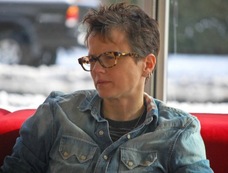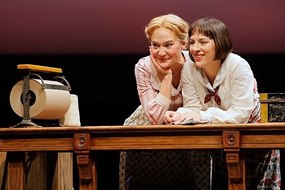 This is Polly Carl, This is Polly Carl, editor of HowlRound. She is awesome. Savage Umbrella Artistic Director Laura Leffler-McCabe responds to the debate over diversity in the Guthrie's 2012-13 Season Announcement Well, Guthrie, you're certainly stirring stuff up. Certainly. As I thought about how to respond to the Guthrie's announcement of their 2012-13 season, I realized I was thinking a lot about how to respond. When I initially saw the announcement, I also saw the Facebook reactions of many talented women in the theatre community who I respect and admire: Leah Cooper, Lisa Channer, Kim Hines, Michelle Hensley, Kira Obolensky, immediately speaking out, reacting. I didn't comment on those Facebook threads. But I did read. All the articles, from the City Pages's 2003 article about the lack of female presence at the Guthrie, to the Star Tribune article, to MPR's article by Kim Hines, to the TPT segment, to Marianne Combs's article on MPR, to Levi Weinhagen's weekly blog on mnplaylist.com, to Polly Carl's moving article "A Boy in a Man's Theater" on HowlRound, to Lauren Gunderson's Huffington Post article. So I read, and I thought. And I thought and I thought. And I told Amber I wanted to write about "the Guthrie mess," and I wasn't sure what to say.  Kate Guentzel and Emily Gunyou Halaas Kate Guentzel and Emily Gunyou Halaas in The Master Butcher's Singing Club Am I appalled? Yes. But it's not new. I remember seeing a production of Picasso at the Lapin Agile at what was then the Missouri Rep (now the Kansas City Rep) in 2000 or 2001, and pouncing on the lead actress at the talk back, pleading to know how it felt to be in a show with significantly fewer female roles than male, and how did she cope with that in her career? I think generally people asked how she memorized all those lines, so she was pretty thrown by my question. Which to be fair, had nothing to do with the play. But she did find me afterward and had a nice heart-to-heart about the realities of being a woman working in the theatre. She was sympathetic, but in a lot of ways, powerless to change it. She had to take roles to make ends meet, and that often meant being the one woman in a sea of men. At any rate. Yes, appalled for a long time. Enough to start my own theatre company where I could make the decisions and write and direct and have that be normal. Lauren Gunderson hit on it perfectly in her article, "Maybe what we really dream of is the day when plays by and about women would stop being ‘women's plays’ and start being -- oh, y'know -- really successful, moneymaking, audience-supported, universal, true, bold, smart plays. Everyone wants those plays, no matter what your gender." So Savage Umbrella isn't a "woman's theatre" (though I highly admire Theatre Unbound, 20% Theatre Company, and all the other companies committed to doing good work by and for women). But I didn't want to be a niche theatre. I just wanted to be a theatre that does good work, that happens to currently have 8 female members out of 11, that happens to have 5 of our 6 projects this year directed by women, and that happens to have 4 out of our 6 projects this year written by women. It isn't an issue with us. We just happen to have more women around, and believe that they are talented enough to direct on our main stage (yeah, that a reference to Joe Dowling's comment that "I employ people because of their talent, male or female. It is a very stern task to direct on a stage of our size, and I am responsible to the board for the shows we produce.") So the question remains, how to respond? I've decided on two main points to bring up. 1. The Guthrie isn't all bad or evil or anything as simple as all that. While I've seen my fair share of shows there that I wasn't impressed by, and while I've skipped seeing many of their shows because I just didn't care, I have seen a few amazing things there. Peer Gynt with Mark Rylance? Caroline, or Change with Greta Oglesby? and (probably less universally well-loved) the world-premiere of The Master Butcher's Singing Club with Emily Gunyou Halaas? All of those shows blew me away, touched me to the core, made me think for months and months after seeing them, and did all the great things that theatre is supposed to do to you. Their recent Macbeth? Well, I had trouble not laughing out loud, I thought it was that bad. So what? Every theatre does work that sometimes misses and sometimes hits.  yes, Laura drove one yes, Laura drove one of these on multiple occasions And I think they have at least three hits in the 2012-13 season. Three world-premieres. That's incredible. That seems like a huge step for them. New work is IMPORTANT. And they're doing a fair amount of new work. Good on them. 2. That's not enough. While it is awesome that they've got three world-premieres for the community to experience, they also have a responsibility to the community. I respectfully disagree with Levi's assessment that instead of hoping the Guthrie will change, we should put our money and efforts elsewhere. I mean, yes, support the theatres that are doing the work you want to see (especially if it's Savage Umbrella, right?). But I think that lets the big G off too easy. As Ben Layne pointed out in his open letter to Joe Dowling, with great power comes great responsibility. Not to mention, they are a non-profit institution, with public funding! It's in their mission statement to present diverse works! They're supposed to be a national leader! Their season just isn't visionary enough. It's not enough. When I was in graduate school, one of my many part time jobs was to assistant coach forensics at my nearby undergraduate institution. One of the strongest memories I have from that time is driving the team in a 15-passenger van. Driving them to every Super8 in rural Kansas, Nebraska, and Missouri, it felt like. And if you've ever driven a monster that is a 15-passenger van you know: those things are big and hard to turn around. The Guthrie is kind of like a 15-passenger van. I understand that it's hard to make big changes at big institutions. But, if I can back that huge van into a McDonald's at 6 am with a van full of under-caffeinated college freshman, I believe the Guthrie can do better. And should. The three world-premieres are a good start. But, seriously, it's been decades that this inequality has persisted. It's not about quotas, it's about taking a chance on talent that isn't milky-white and that doesn't have a penis. You take a risk a couple of times, and suddenly it doesn't feel so risky anymore. I promise.
Comments are closed.
|
Archives
November 2020
|

 RSS Feed
RSS Feed




